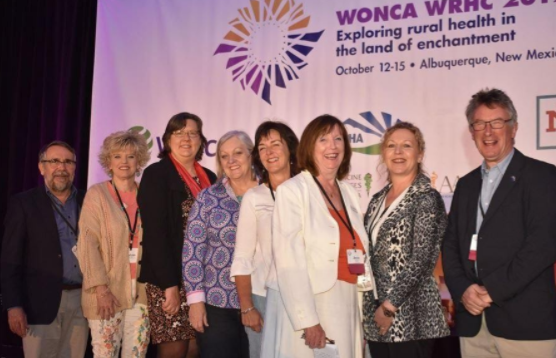
If we are to achieve Universal Health Coverage (UHC) in the foreseeable future, it will be the rural and isolated parts of the world that will provide us with the greatest challenge. Although just under 50% of the global population live in rural areas, only 34% of the world’s nurses and 24% of the world’s doctors work in rural areas. 56% of the globe’s rural population do not have access to health whereas only 22% of those living in towns and cities are denied care.
The Declaration of Astana emphasised the importance of primary health care in meeting the needs of those who are currently denied health care. The declaration went on to describe the primary care workforce as being multi-professional and multidisciplinary. The future of rural health care will be in the development of dynamic teams of professionals working together and bringing their different skills and knowledge to meet the needs of their patients and communities.
The 16th WONCA World Rural Health Conference in Albuquerque, New Mexico (USA) on the 15th October 2019 unanimously agreed a statement and a commitment to the importance of nursing in rural health care and to Nursing Now 2020.
The Statement
We, the delegates of the 16th WONCA World Rural Health Conference, support the United Nations Member States high-level political declaration adopted at a one-day meeting in New York on the theme of Universal Health Coverage: Moving Together to Build a Healthier World (September 2019) which aims to:
- strengthen Primary Health Care for Universal Health Coverage
- ensure quality and affordable access to medicines, vaccines, diagnostics and health technologies
- protect people from suffering financial ruin due to health costs
- implement high-impact health interventions to combat diseases and protect women’s and children’s health
- strengthen the health workforce and infrastructure
- reinforce governance capacity to achieve these goals
We also support the further recommendation to scale up efforts to promote the recruitment and retention of competent health workers and encourage incentives to secure the equitable distribution of qualified health workers especially in rural and hard-to-reach areas.
Rural WONCA is committed to support universal health coverage, equitable access to services and provide leadership in primary health care, and to achieving this goal in rural and remote communities around the world.
Rural and remote nurses and midwives are in a position to influence change in rural and remote healthcare and improve the quality of patient care by virtue of their professional standing.
Nurse leaders are aware of, understand and can respond to political imperatives that impact on health service delivery and nursing and midwifery practice in rural and remote areas (adapted from Talbert, 2012).
We pledge to support, advocate for, and promote nurses and midwives worldwide to be collaborative leaders to advance this goal.
In doing so we, Rural WONCA pledge to:
- support the rural and remote nurse and midwife voice by inviting nurses and midwives to participate in decision making and leadership
- promote partnerships by advocating the need for equity in participation
- promote the importance of generalism in nurse training and practice
- promote collaboration in reviewing Rural WONCA’s mandate, to further promote nursing and midwifery inclusiveness
- actively embed research and data collection to demonstrate a better understanding of the value of rural and remote nursing and midwifery and of nursing and midwifery led care
- actively promote full scope of practice in rural generalist nursing
- support an integrated patient and family centred, team-based care that addresses community needs
Gaining this statement and commitment on behalf of Rural WONCA was beyond our initial expectations. However, we need to plan for the future to be able to address the commitments and to enable UHC for all especially in rural and remote communities with colleagues within Rural WONCA.
The 17th Wonca World Rural Health Conference will be held in Dhaka, Bangladesh 15th-18th April 2020 (https://www.wrhc2020.com). We plan to take the statement forward and hope that as many nurses as possible are able to attend. We aim to plan a way forward across multi-professional and multidisciplinary groups to help achieve UHC and Health for all rural people. It is our hope that this approach will lead to research collaborations, academic links and joint initiatives to inform future rural health care provision.
The deadline for abstract submissions is 31st January 2020 (https://wrhc2020.com)
About Rural WONCA
WONCA is the World Organisation of Family Doctors and its mission is to improve the quality of life of people globally by setting standards and by promoting values, which include respect for universal human rights, gender equity, and developing high standards of care in general practice/family medicine.
RuralWONCA is an active and dynamic network of rural family doctors and academics from across the world. It was constituted as a permanent working party within WONCA in 1995. RuralWonca is led by its Council on which there are now two nursing Council members, Shelley Nowlan, the Chief Nursing Officer for Queensland Australia and myself Joyce Kenkre, Professor of Primary care, Associate Director for PRIME Centre Wales, UK.


